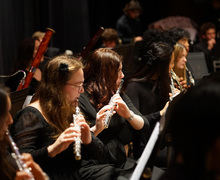SU students abroad in Chile remain in country during ongoing civil unrest
Courtesy of Paula Lopehandia Marticonera
All university classes have been canceled except for those led by the Syracuse Abroad program.
Christian Andino Borrero kept looking over his shoulder on the Oct. 21 WhatsApp video call. It was around 7 p.m. in Santiago, Chile, and he was inside with his host family.
Andino Borrero, a Syracuse University junior studying abroad in Chile, didn’t have much of a choice. A curfew was in effect, so he had to stay inside. It was three days since protests had erupted in Santiago. He turned around again.
“That’s a helicopter, like a military one. Give me a second. Can you hear it?” Andino Borrero asked.
SU students studying abroad in Chile remain in the country as it experiences ongoing protests that started on Oct. 18. The protests began after the price for the Santiago metro system was raised by 30 pesos, or four cents in the United States.
All university classes have been canceled except for those led by the Syracuse Abroad program, said Erika Wilkens, executive director of SU Abroad, in an email. Classes from partner universities were set to resume on Nov. 4.
“We are in constant communication with our students,” Wilkens said. “To note, students live in neighborhoods that have not been directly impacted by the protests in any significant way.”
SU students studying abroad did not say that they feel their safety has been compromised.
“You can feel in the atmosphere that there’s a lot of contention with the protests going on,” said Dylan Bryant, a senior in the College of Arts and Sciences. “Even though it’s not directly happening in the neighborhood I’m staying in, it’s very palpable.”
Though the price hike may have been the issue that sparked an outcry, the demonstrations represent a broader protest against the country’s wealth inequality. Just 1% of Chileans earn 33% of the nation’s total wealth, according to NBC News. Chileans are also looking to change the country’s constitution, and many are calling for the resignation of President Sebastián Piñera, who currently has a 14% approval rating.
At least 19 people have died in the protests, according to the Los Angeles Times. Piñera declared a state of emergency on Oct. 18 and implemented a curfew.

Eva Suppa | Digital Design Editor
The afternoon of Oct. 18, Andino Borrero came home from classes and planned to go out with his friends later that night. He was in his room when his host mom started calling his name urgently.
“My host mom calls me from my room, and she’s like, ‘It’s a wreck, it’s a wreck.’ She keeps repeating that. She said, ‘I strongly recommend that you don’t go out tonight,’” Andino Borrero said.
The news was showing tear gas and tear bombs being thrown at protestors. Andino Borrero’s host father had passed by the mall on the way to the house and had to drive through the tear gas. Later that night, people started setting fire to buildings.
Andino Borrero and his host mom decided to briefly go out for a cacerolazo, a form of protest using pots and pans to make noise. His host mom didn’t let him protest with her because of a rule prohibiting foreigners to protest in Chile.
The SU Abroad staff on the ground is providing resources, information and support to students, Wilkens said. They are also working with in-country experts, campus partners and international partners, including the U.S. State Department and International SOS, a leading travel security and medical services firm.
Though Santiago’s curfew was lifted on Oct. 26, the country’s military is still active. There’s been reports of excessive force by Chilean military and police, said Erin Susko, a SU senior studying abroad in Chile this semester.
“The alarming part is the concern about impunity and concern about human rights violations,” Susko said.
Piñera’s rhetoric is also concerning, she said. He has referred to the protesters as an “internal enemy,” which is the same rhetoric used during Chile’s military dictatorship. The dictatorship lasted for 17 years, ending in 1990.
Susko is in favor of the protesters and the fact that the demonstrations have been peaceful for the most part. She noted that many different issues are being discussed, leading more than a million people to demonstrate in Santiago.
“It’s really amazing to see so much organization and mobilization of so many people,” said Susko. “I hope they do get the demands they’re looking for.”
Published on November 6, 2019 at 9:14 pm





